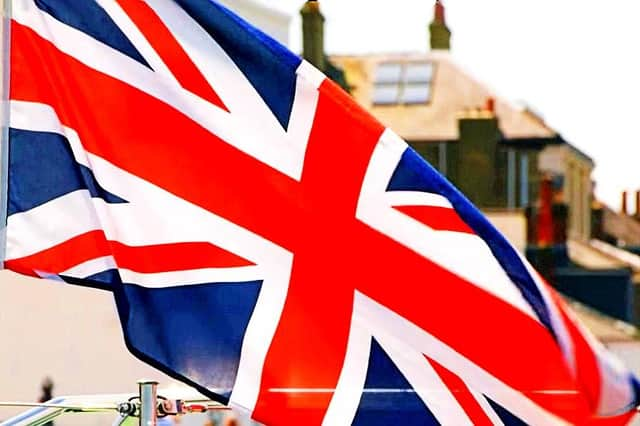Jamie Bryson: 'Forgive them for they know not what they do' no longer applies when it comes to the Protocol / Windsor Framework


An issue which has escaped attention, despite its fundamental character, is the extent by which – as a matter of law – sovereignty over Northern Ireland has been, in significant part, surrendered.
There is a clear and present danger in the ongoing negotiations that this constitutional harm is further embedded.
Advertisement
Hide AdAdvertisement
Hide AdThe Northern Ireland Act 1998 creates the constitutional framework for devolution (and for present purposes, we’ll leave aside the multiple flaws in that structure).
It contains in section 23(1) a crucial provision: that “the Executive power in Northern Ireland shall continue to be vested in Her (His) Majesty”.
Whatever else about the 1998 Act and / or the Belfast Agreement (and, it is worth pointing out, this crucial provision contradicts the Belfast Agreement in a helpful way for unionists), this provision enshrines in law the continued sovereignty (i.e., who has the final say) of the Crown over Northern Ireland, which – in practical terms – directs itself to exercise of prerogative and executive powers.
However, it has been completely overlooked that this provision is also ‘subject to’ (see section 7A of the European Union (Withdrawal) Act 2018) and thus subjugated by the Protocol / Windsor Framework.
Advertisement
Hide AdAdvertisement
Hide AdThis is so because, due to the continued application of EU law enshrined within the Protocol, lawmaking (‘executive’) powers over Northern Ireland are not ultimately vested in the Crown, or in Parliament, but rather a foreign power.
The Stormont Brake, conceived within the Windsor Framework, does not remedy this but in fact embeds the surrender of sovereignty.
This is so because even if the deceptively-named Stormont Brake (which doesn’t in fact reside at Stormont at all) is pulled, and even if the UK Government make the required notification, if the EU disagree then ultimately the matter is finally determined by an arbitration panel pursuant to Article 175 of the Withdrawal Agreement.
A ruling of an arbitration panel against the UK means the relevant EU law, even though it may be objected to by Stormont, the UK Government, and even the UK Parliament, will nevertheless have full effect in Northern Ireland from the first day of the second month following the arbitration ruling.
Advertisement
Hide AdAdvertisement
Hide AdIt may be said that Parliament, in the exercise of its sovereign rights, has willingly given away significant aspects of sovereignty over Northern Ireland.
As a matter of domestic law at least, Parliament could in theory take back that which it has given away.
However, this is not true as a matter of international law, as the surrender of sovereignty over Northern Ireland forms part of an international treaty between the UK and European Union.
A little like the subjugation of the Acts of Union, or more recently the Rwanda Bill, it may be that the Government and Parliament haven’t really appreciated the full effect of what they are doing, and / or the depth by which the Protocol / Windsor Framework has infected our fundamental constitutional arrangements.
Advertisement
Hide AdAdvertisement
Hide AdThe old Biblical phrase “forgive them; they know not what they do” may have been an arguable retrospective defence, but the Government – or, indeed, any unionist negotiating with them – can no longer claim to be blind to this issue, or the constitutional effect it brings about.
There has been talk about ‘strengthening’ or widening the scope of the Stormont brake. Unionist negotiators ought to be careful.
What may look like a superficial ‘win’ in substance may in fact (further) embed something of significant constitutional harm: namely the erosion of the vesting of executive power in the Crown, in Northern Ireland.
The Stormont brake is a procedural device which vests the final say (‘sovereignty’) in a foreign body over whether foreign law shall apply to NI.
Advertisement
Hide AdAdvertisement
Hide AdThe relevant EU law automatically applies in Northern Ireland if there is an arbitration decision to that effect, thus leaving nothing – certainly nothing without tearing up the UK-EU treaty and dissappling section 7A of the EUWA 2018 – that the UK Government or Parliament can do about it.
The Stormont brake as it is already formulated plays a thus far under-examined role in undermining Northern Ireland’s place in the Union.
It is a clear and present constitutional danger, which ought to be resisted not championed.
It was foolish, and remains foolish, for any unionist to embrace the ‘brake’ because in doing so a prerequisite is that you embrace its fundamental premise: that ultimately sovereignty, in terms of the all-important last word, rests not with our Parliament but rather with a foreign entity in relation to a wide swathe of law applicable to Northern Ireland.
Advertisement
Hide AdAdvertisement
Hide AdThat, at the most elementary level, is destructive of our equal citizenship which fundamentally seeks nothing more than that we be treated as equal British citizens, governed by laws made by the British Parliament and administered by British courts.
We seek no more than this.
Jamie Bryson, Centre for the Union, Donaghadee